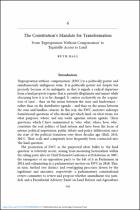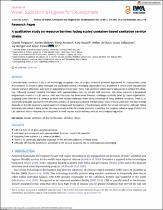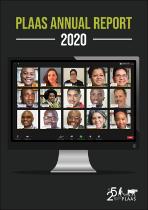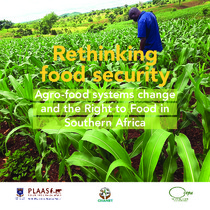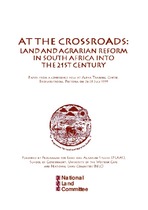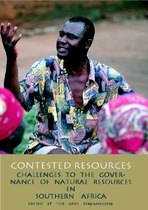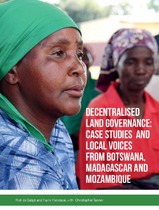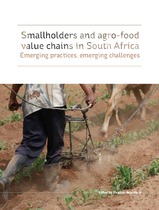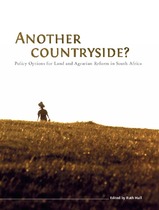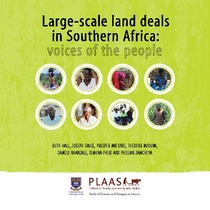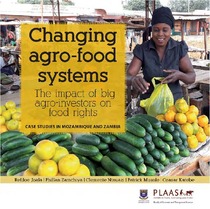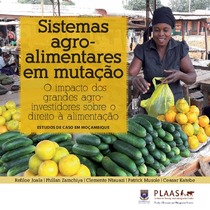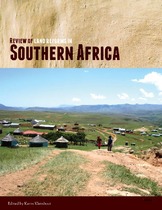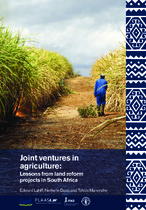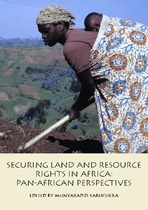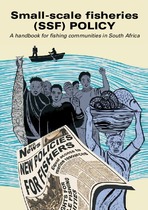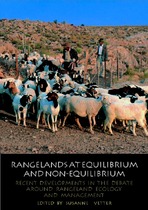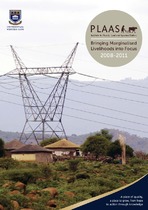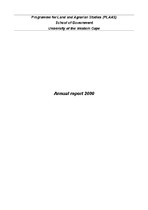Books and Book Chapters
Browse by
Recent Submissions
-
The constitution’s mandate for transformation From ‘expropriation without compensation’ to ‘equitable access to land’
(Cambridge University Press, 2024)Expropriation without compensation’ (EWC) is a politically potent and simultaneously ambiguous term. It is politically potent not despite but precisely because of its ambiguity, in that it signals a radical departure from ... -
A qualitative study on resource barriers facing scaled container-based sanitation service chains
(International Water Association publishers, 2022)Container-based sanitation (CBS) is an increasingly recognised form of off-grid sanitation provision appropriate for impoverished urban environments. To ensure a safely managed and sustainable service, a managing organisation ... -
PLAAS Annual Report 2020
(Institute for Poverty Land and Agrarian Studies (PLAAS), 2021)In our previous Annual Report, I remarked that 2019 seemed to be a year of the gathering storm. Little did we know what was coming. As we looked forward to 2020, we knew that it was going to be a significant year. For one ... -
Agriculture, value chains and the rural non-farm economy in Malawi, South Africa and Zimbabwe
(Spinger Nature, 2019)This chapter compares rural development in Malawi, South Africa and Zimbabwe, concentrating on agricultural value chains and their implications for the rural non-farm economy (RNFE). Based on detailed qualitative exploration, ... -
Rethinking food security Agro-food systems change and the Right to Food in Southern Africa (Malawi)
(Institute for Poverty Land and Agrarian Studies (PLAAS), 2019)This information resource serves as a practical guide aimed at state officials and policymakers on the right to food and critical perspectives on changing agro-food systems within the context of climate change. It does so ... -
At the crossroads: Land and agrarian reform in South Africa into the 21st century
(Institute for Poverty, Land and Agrarian Studies, University of the Western Cape, 1999)The land sector has always been characterised by lively and public arguments over policy, and some of the central and recurring themes of the previous five years of debate were expected to surface at the conference. ... -
Contested resources: Challenges to the governance of natural resources in Southern Africa
(Institute for Poverty, Land and Agrarian Studies, University of the Western Cape, 2002)In this keynote address I wish to identify some important ideas and conclusions arising out of recent analyses of theory and practice on natural resource management. I use these in a preliminary attempt to argue that ... -
Decentralised land governance: Case studies and local voices from Botswana, Madagascar and Mozambique
(Institute for Poverty, Land and Agrarian Studies, University of the Western Cape, 2011)Decentralisation has been on the Southern African development agenda for a long time. It is a concept which appears deceptively simple. The principle of subsidiarity holds that decision making about local development ... -
Smallholders and agro-food value chains in South Africa: Emerging practices, emerging challenges
(Institute for Poverty, Land and Agrarian Studies, University of the Western Cape, 2013)A key emerging strand in the development of smallholder agriculture in South Africa is the effort to integrate smallholders into corporate food retail value chains. In this, the private sector and government have a ... -
Another countryside? Policy options for land and agrarian reform in South Africa
(Institute for Poverty, Land and Agrarian Studies, University of the Western Cape, 2009)Land reform in South Africa is a political project that has foundered. For years, the process has been variously described as being ‘in crisis’, ‘at a crossroads’, ‘at an impasse’ or simply ’stuck’. This still seems as ... -
Large-scale land deals in Southern Africa: Voices of the people
(Institute for Poverty, Land and Agrarian Studies, University of the Western Cape, 2015)This book of case studies addresses situations in which commercial projects are planned on land held by rural communities. These include big farming projects by foreign and local companies, farmers becoming out-growers selling ... -
Changing agro-food systems: The impact of big agro-investors on food rights: Case studies in Mozambique and Zambia
(Institute for Poverty, Land and Agrarian Studies, University of the Western Cape, 2016)This book presents case studies that offer some insights into the rapid process of change underway in African agro-food systems, and in Southern Africa in particular, within the context of land-based and agricultural ... -
Sistemas agroalimentares em mutação O impacto dos grandes agroinvestidores sobre o direito à alimentação: Estudos de caso em Moçambique
(Institute for Poverty, Land and Agrarian Studies, University of the Western Cape, 2016)Este livro apresenta casos de estudo que oferecem algumas perspectivas do rápido processo de mudança em curso nos sistemas agro-alimentares africanos, e na África Austral em particular, no contexto dos investimentos ... -
Review of land reforms in Southern Africa
(Institute for Poverty, Land and Agrarian Studies, University of the Western Cape, 2010)Land, and access to land, is one of the most important assets for the poor in southern Africa, both rural and urban, and probably contributes more than any other factor to their economic survival and the quality of ... -
Joint ventures in agriculture: Lessons from land reform projects in South Africa
(Institute for Poverty, Land and Agrarian Studies, University of the Western Cape, 2012)Recent years have witnessed renewed interest in ‘inclusive business models’ in agriculture, as part of wider discussions about growing agricultural investment in lower income countries. Inclusive models aim to include ... -
Securing land and resource rights in Africa: Pan-African perspectives
(Institute for Poverty, Land and Agrarian Studies, University of the Western Cape, 2004)Across the African continent the land and resource rights of the rural poor are threatened by inappropriate policies and institutions (including global treaties); unequal social, political and economic relations; the ... -
Small-scale fisheries (SSF) policy: A handbook for fishing communities
(Institute for Poverty, Land and Agrarian Studies, University of the Western Cape, 2014)The Marine Living Resources Act, 18 of 1998 (MLRA), excluded smallscale and artisanal fishers who catch and sell fish to sustain livelihoods. Furthermore, it also excluded those involved in post harvesting and other activities ... -
Rangelands at equilibrium and non-equilibrium recent developments in the debate around rangeland ecology and management
(Institute for Poverty, Land and Agrarian Studies, University of the Western Cape, 2003)The debate on equilibrium vs non-equilibrium dynamics in pastoral systems emerged in the early 1980s, when economists, ecologists and social scientists began to challenge the widespread claims of overgrazing and degradation ... -
Bringing marginalised livelihoods into focus, 2008-2011
(Institute for Poverty Land and Agrarian Studies (PLAAS), 2012) -
Annual report 2000
(Institute for Poverty Land and Agrarian Studies (PLAAS), 2001)The Programme for Land and Agrarian Studies (PLAAS) focuses on the land restitution and redistribution programmes initiated by the post-apartheid democratic state; land tenure reform; emerging regimes of natural resource ...

